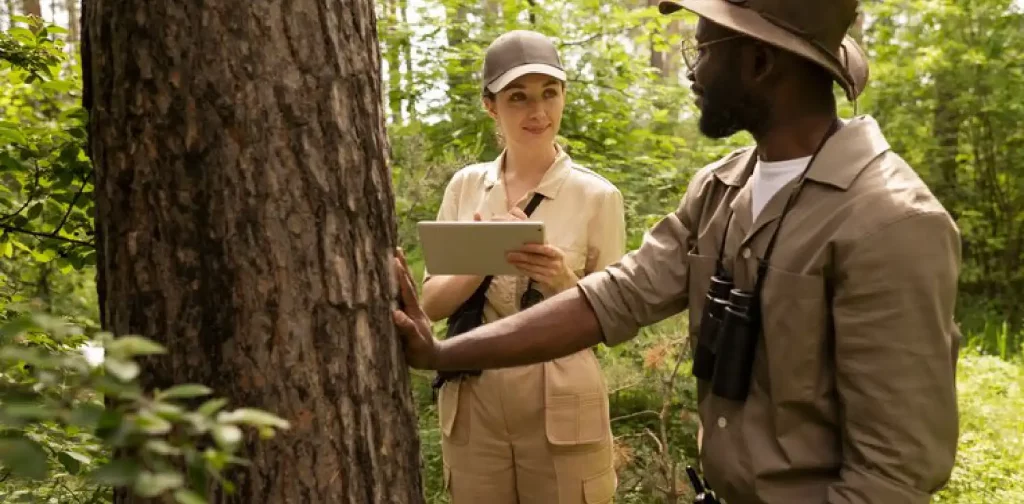Training Indigenous Peoples and Local Communities to be Citizen Scientists

Photo: Freepik.
Indigenous Peoples around the world coexist with and live largely dependent on nature. They have specialized knowledge on not only how to utilize the assets of nature but also to preserve them. Facilitating and advancing their centuries of knowledge and wisdom with technology and modern scientific methods would benefit everyone and the planet. Cool Earth, a UK-based organization, aims to empower Indigenous Peoples and local communities (IPLCs) by training them to be citizen scientists to help conserve rainforests.
Indigenous Peoples and Local Communities as Citizen Scientists
The term ‘citizen scientist’ refers to the general public being involved in scientific research by sharing and contributing to data monitoring and collection. This form of public participation connects the academic community with numerous eyes on the ground, the ones closest to the objects of research. In theory, citizen science should also improve how the scientific community approaches nature with local knowledge and wisdom.
In rainforest conservation, citizen scientists can come from Indigenous Peoples and local communities living in and around the forests. Indigenous-led, technology-assisted climate actions are already taking place in some of the most remote rainforests worldwide. Training IPLCs as citizen scientists to provide important data will hopefully, in turn, help them regain control over their lives, their land, and the future of their rainforests.
Cool Earth and Rainforest Conservation
Cool Earth is a UK-based organization with a focus on protecting rainforests. This non-profit organization provides IPLCs across the globe with technology and scientific knowledge to help combat deforestation.
One of Cool Earth’s programs is the Rainforest Labs. This program is run by rainforest monitors and local communities that have received training from the organization on how to operate the technology for early warning systems and alerts for wildfires and illegal logging.
In the Junin Province of Peru, Cool Earth trains local communities in fire detection, management, and monitoring in collaboration with the Indigenous federation CARE (Central Ashaninka of the Rio Ene). Meanwhile, the program in Papua New Guinea primarily helps identify illegal logging roads.
Matt Proctor, forest impacts lead at Cool Earth, said, “No matter which community of rainforest area you look at, the challenges for the people who live there are increasing but their resilience remains. Combined with their exceptional knowledge about living at one with the rainforest and protecting it for future generations, there is hope.”
Real Action Needed
Still, training Indigenous Peoples and local communities to become citizen scientists should not be the only strategy for community engagement. Complementing this model with other tangible measures that can raise community awareness and encourage active participation in forest conservation is essential.
“Engagement activities such as raising awareness in communities and schools – alongside biodiversity training and the Rainforest Lab project were helping to manage the threat,” said Regina Kewa, Cool Earth’s program manager for Milne Bay Province in Papua New Guinea.
After all, IPLCs are the ones most affected by deforestation and climate change. At the same time, they are the ones least responsible. Therefore, putting pressure on governments and business entities to create robust policies and take bold climate actions remains crucial for sustainable development.

Co-create positive impact for people and the planet.
Amidst today’s increasingly complex global challenges, equipping yourself, team, and communities with interdisciplinary and cross-sectoral insights on sustainability-related issues and sustainable development is no longer optional — it is a strategic necessity to stay ahead and stay relevant.




 Indian Gig Workers Push Back Against 10-Minute Delivery Service Strain
Indian Gig Workers Push Back Against 10-Minute Delivery Service Strain  Call for Governance: Grassroots Initiatives Look to Scale Efforts to Conserve Depleting Groundwater
Call for Governance: Grassroots Initiatives Look to Scale Efforts to Conserve Depleting Groundwater  Integrating Environment, Climate Change, and Sustainability Issues into Education Systems
Integrating Environment, Climate Change, and Sustainability Issues into Education Systems  Finally Enforced: Understanding the UN High Seas Treaty
Finally Enforced: Understanding the UN High Seas Treaty  Risks and Opportunities of Submarine Communication Cables for Sustainable Development
Risks and Opportunities of Submarine Communication Cables for Sustainable Development  Rising Attacks and Violence Against Land and Environmental Defenders
Rising Attacks and Violence Against Land and Environmental Defenders